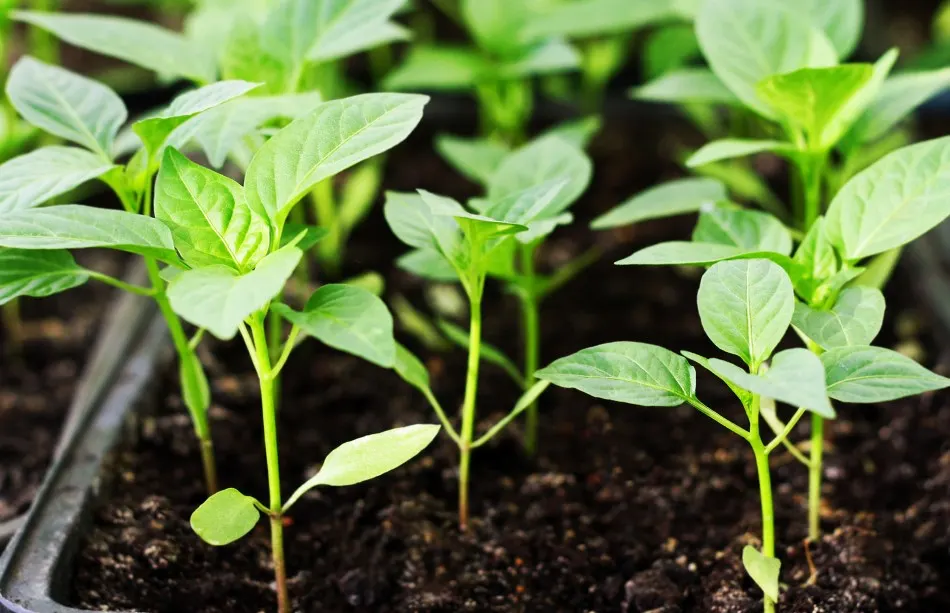On the surface, growing peppers and using compost seem easily compatible. Plants need nutrients to grow, and compost is a nutrient-rich material. However, to get the best results from both your pepper plants and compost, there are a few things you should know.
Compost is a nutrient-rich substance that helps plants thrive and produce good quality fruits. Pepper plants need compost for each stage of their development. As good as compost is for peppers, you should not make compost out of old plants without first checking for diseases.
This guide will help you decide when to add compost to your pepper plants, how much, and what to look for in a pepper-friendly compost. These nine tips will set you up for healthy peppers and fertile soil.

Do Pepper Plants Like Compost?
Pepper plants, like most garden plants, love compost and benefit greatly from it. It takes a large amount of energy and nutrients for pepper plants to produce their fruits, so nutrient-rich soil, whether from compost or other fertilizers, is critical to their growth.
Flowering and fruiting plants need a lot of nutrient support. Well-mixed compost made from a variety of materials will give your pepper plants all of the nutrients they need, while also keeping their roots moist.
What is the Best Compost for Pepper Plants?
A pepper plant will need different nutrients throughout its growth cycle. The compost you start with might not be the best compost for when the plants are fruiting. Nitrogen is helpful early on in the growth to support strong stems and plentiful leaves. Later in the plant’s life, your compost should have a higher balance of phosphorus and calcium to support the fruit growth.
Peppers need significant calcium to build the strong cell walls of the fruits. Without it, the walls of the fruit can collapse and begin to rot before you can harvest them. At the same time, peppers should not have an abundance of nitrogen after they start fruiting, as this will encourage the plant to grow more leaves at the expense of the fruit.
You can always adjust the kind of compost you are using according to your plant’s growth stage, and a nicely balanced compost that contains all the nutrients a pepper needs can help your plants grow at any stage of their lives.
Fertilizers have 3-number codes on their bags that indicate the amounts of nitrogen, phosphate, and potassium are in the mixture. A 5-10-10 fertilizer is ideal for maximizing pepper yield. It contains an equal amount of potassium and phosphorus and half as much nitrogen.
How to Apply Compost to Pepper Plants?
Before you plant your pepper plants, you should mix compost in with your soil. Your garden’s nutrient content and planting history will help you determine how much new compost you need. You should test your soil before adding compost to determine the existing pH and nutrient content.
Once your pepper plants are in the ground, you should add more compost to your plants’ bases after two weeks, and then again when they start to produce fruits. Peppers have a long growing season, and some plants will fruit more than once. If this is the case, keep an eye on your plants to see if the second round of fruits needs more nutrient support.
How Much Compost to Apply to Your Pepper Plants
The first round of compost should go into the soil before you plant. Tilling or mixing the earth will prepare it nicely for pepper plants. After the plants have sprouted, you should add more compost on top of the soil and around the plants.
Do not mix new compost in once your plants begin to grow. This can disrupt the root growth. Additionally, peppers often need a layer of mulch over their roots to help them retain moisture. Move the mulch first, then add the compost so the roots can absorb the nutrients more easily.
A good schedule to follow is to fertilize your plants every 1-2- weeks as your plant grows. Using a higher ratio of nitrogen during the earlier stages of growth will encourage larger pepper yields later on. When your plant reaches its mature size and begins to blossom, you can move to a compost with lower levels of nitrogen and higher levels of potassium and phosphorous to encourage pepper growth. If you notice your flowers are falling, then hold off on fertilizing, as that is a sign the plant has been over-fertilized.
Can Too Much Compost Kill or Harm Your Pepper Plants?
Too much of any one nutrient is bad for your pepper plants. You should be careful with the amount of compost you use and what is in the compost. Nitrogen is notoriously bad for pepper plants in the later stages of growth, as it will siphon too much of the plant’s energy into growing leaves and foliage instead of fruits.
Too much compost is not going to kill your pepper plants, but it might cause the fruit to rot or limit the number of blossoms they produce. The right balance of nutrients will help your pepper plants thrive, so you should regularly monitor your plants to make sure they are growing as expected.

When to Apply Compost to Pepper Plants
Because peppers like fertile soil, you should mix compost into your soil when you are first planting your peppers or transplanting them if you started your seeds indoors. Once your plants begin to fruit, you should side-dress them.
Side-dressing is the process of adding fertilizer to the sides of the plants’ stems. Watch your peppers’ growth and make adjustments to their nutrients as needed to maintain steady growth. If you notice problems like blossom drop, increase the amount of calcium you are giving the plants.
How Often Should You Add Compost to Pepper Plants?
Peppers need richly fertilized soil for their whole growing season. Before you plant them, mix compost in with the earth, and then continue to add compost regularly. Side-dressing at every new growth stage is an excellent way to keep your peppers on track, making adjustments for nutrient content as needed.
The quality of the soil you are starting with will impact how much compost you will need to add, so be sure to test your soil at the beginning of the season. Knowing the pH and nutrient make-up of your soil will help guide your decisions about what to add and when.
What Nutrients Can Your Pepper Plant Get from Compost?
Compost is a perfect example of “you are what you eat.” Good compost will have all the nutrients of commercial fertilizer, as well as a host of macronutrients. Nitrogen, phosphorus, potassium, calcium, magnesium, and sulfur, among other things, are all common in compost. Exactly what is in your compost depends on what made it in the first place, so testing your compost is just as important as examining your soil.
Whether you are making your compost or buying it, you should be mindful of its contents. Like any other plant food, you want to balance the nutrients in the compost with what the pepper plant needs most.
Can You Compost Your Old Pepper Plants?
You can technically compost pepper plants and the fruits will break down quite quickly. The pepper fruits that are too small to eat at the end of the growing season are great candidates for your compost heap.
The small fruits are often bitter, so if they are otherwise healthy, it is safe to compost the fruit.
However, pepper plants are particularly prone to pests and disease, so composting an old pepper plant could contaminate all of your compost. To be safe, you can have a separate compost area for your old pepper plants and any other disease-prone plants you might grow, such as tomatoes. If you are sure your pepper plant is not riddled with disease, than you can use it for compost, if you don’t plan on overwintering it for the following season.
Closing Thoughts
Compost is a useful ingredient for growing the best possible pepper plants. It is a great alternative to store-bought soil fertilizers and mixes that can support your peppers at every stage of their growth. However, use caution when composting old plants, as peppers are susceptible to disease.
Here are Some of my Favorite Gardening Products and Tools
Thank you for reading this article. I hope you found it helpful for growing some new plants in your home or garden. Here are some products I like that I hope you’ll also find helpful. These are affiliate links, and I am compensated for referring traffic. But in all honesty, these are the exact product that I use or recommend to everyone.
Soil: For high-quality soil, I really like Fox Farm Ocean Forest. I do all my growing in containers and this soil has worked great for me. I like how they use nutrient-rich contents like earthworm castings, bat guano, and composted crab and fish.
Fertilizer: Currently I am using a seaweed-based organic fertilizer call Neptunes Harvest. This is a great milder fertilizer option if you want to use something organic. If you want a more powerful fertilizer, I recommend Fox Farm Liquid Nutrient Trio, lots of people have had great growing success with this product.
Pruning Shears: Pruning shears are one of the most useful gardening tools to have because it’s important to prune your plants to keep them healthy. The pruning shears I recommend are the Gonicc 8’’ pruning shears. I like them because they are built sturdy and work both on bigger and smaller plants, so you don’t need to have multiple pruning shears.
spicytrio.com is a participant in the Amazon Services LLC Associates Program, an affiliate advertising program designed to provide a means for sites to earn advertising fees by advertising and linking to Amazon.com. spicytrio.com also participates in affiliate programs with other sites. spicytrio.com is compensated for referring traffic and business to these companies.
